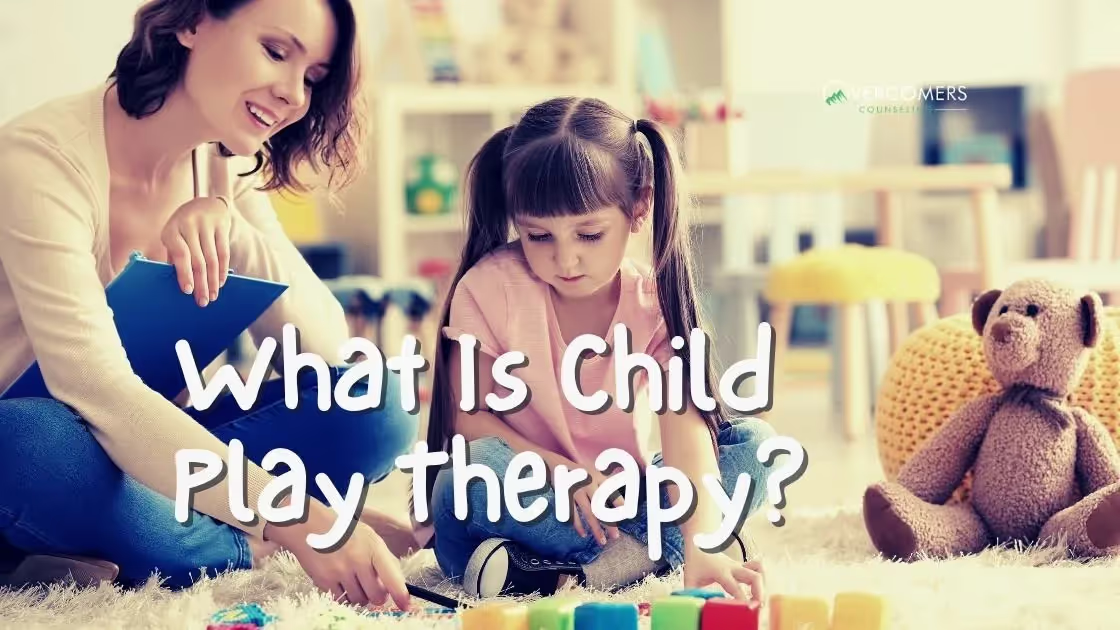Play is the language in which children learn. It unlocks a whole new world for them. Play helps them to express themselves, explore their imaginations, and...

Play is the language in which children learn. It unlocks a whole new world for them. Play helps them to express themselves, explore their imaginations, and provide endless amounts of creativity for them to draw from. It can also be a therapeutic way for them to communicate the things that they may not be able to say. Since children are not necessarily fully equipped to understand their emotions, play therapy helps them to help their therapists release the feelings a child experiences. Below we will detail exactly what child play therapy entails, and how you can set up an appointment with one of our child play therapy counselors.
In therapy and counseling, play therapy is primarily used for children because they often lack the ability to fully express their emotions and understand how to address them. The term "play therapy" encompasses a wide range of approaches that counselors use, including toys, board games, and pretend play. Since play is a natural way for children to learn and make sense of the world around them, it provides a safe and effective outlet for processing emotions. When children experience overwhelming feelings, play therapy can be a helpful option. Through play, counselors can observe how a child interacts and use their play style to guide them in managing difficult emotions. Play therapy is particularly beneficial for children dealing with grief, loss, trauma, divorce, and other challenging life experiences.
Therapists use their observations of a child’s play to facilitate a discussion about what the child might be feeling or thinking. By observing how a child interacts with specific toys or games, therapists can often uncover hidden emotions. In child play therapy, children might act out scenarios related to anxiety, anger, or other emotions, which can then be discussed with the therapist afterward. Based on these observations, the therapist can develop a tailored treatment plan for the child and share their approach for helping the child work through their emotions and challenges.
We know as parents, there are literally thousands of toys out there.
What makes a toy useful for child play therapy?
Listed below are some of the more common toys that counselors use in order to help children find their voice.
- Dolls
- Action figures
- Blocks
- Construction toys
- Arts and crafts supplies
- Toy phone
- Stuffed animals
- Puppets
They also may employ the use of different techniques like musical play, dancing, creative storytelling, and role-playing. In combination altogether, these techniques can help your child's therapist to help identify what they are feeling and how they can address it together.
You may be wondering what some examples of play therapy might be. For instance, if your child's counselor has a dollhouse in their office, they may ask your child to choose some dolls and act out a scene from their home life. This is where the deep insight comes from play therapy, the counselor can see things like family dynamics. Another example is to taking a stuffed animal and giving it to the child, and asking the child how they think the animal is feeling that day. If they say sad, then the counselor can look deeper into that and try to help your child have their own voice with their emotions.
By following the easy steps below, you can easily make an appointment for your child at Overcomer's Counseling.
1. First, when you call (719) 345-2424, you will be greeted by one of our receptionists, who will assist you throughout the call.
2. They will help you book an appointment with the child play counselor of your choice.
You can see all of our available child play therapy counselors in by clicking here.
Take some time to look through each counselor to find one that is suitable to your child's needs or the issues your child may be facing.
3. During the initial call, you will be asked for your insurance and contact information. The receptionist will verify your child's insurance coverage.
4. Afterwards, an e-mail will be sent to you containing your child's intake paperwork. You may either print it out, fill it out, and bring it with you to your initial visit with your counselor. Alternatively, you can instead upload the paperwork into our client portal.
5. When the day of your child's appointment comes, you will be able to speak to your child's counselor about what has been bothering them or to help them explore what are the best methods of helping them. At the end of your child's first session, you will be able to talk to their counselor about when you would like your child to see them next, and you can easily schedule your next appointment.
Play therapy is a great approach to helping your child to more healthily communicate their feelings.
By using play, they are able to express themselves in a calmer and better way. With help from a counselor, they can unlock how they feel, and alongside the therapist, as their parent, you can help your child get the help they need and get them to feeling better as soon as possible. If your child has a favorite toy that you may think might be helpful within their counseling sessions, that is something that you can easily speak to their counselor about, of which, they probably won't have much objection to. The beautiful thing about child play therapy is that so much good can come out of it. Children learn how to grasp and handle their emotions in a healthy way, all through the magic of playing.
https://www.healthline.com/health/play-therapy#how-it-works
https://www.a4pt.org/page/PTMakesADifference/Play-Therapy-Makes-a-Difference.htm
Help your child by providing support and guidance, using positive language, highlighting the progress they have made, breaking down the challenge into smaller steps, and motivating them with positive affirmations.